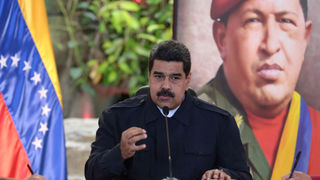Bolivarian Missions
 Doing good in the Bolivarian Republic of Venezuela | |
The Bolivarian missions are a series of social programmes implemented under the administration of former Venezuelan president Hugo Chávez[1] and continued by Chávez's successor, Nicolás Maduro, with the programmes focusing on social justice, social welfare, anti-poverty, educational, and military recruiting.
The missions draw their name from the historical South American hero, Simón Bolívar.
Anti-poverty
Using increasing oil prices since the early 2000s and funds not seen in Venezuela since the 1980s, Chávez created "Bolivarian missions", which entailed the launching of government anti-poverty initiatives,[2] the construction of thousands of free medical clinics for the poor,[3] indigenous rights,[4][5] and the enactment of food[6] and housing subsidies.[7] The Bolivarian missions are overseen with widespread experimentation in what Chávez's supporters call "citizen- and worker-managed governance."[8]
Helping the poor
Mission Robinson (literacy), Mission Barrio Adentro (free medical coverage), and Mission Mercal (affordable food) are considered among the most important missions.[9]
Related Document
| Title | Type | Publication date | Author(s) | Description |
|---|---|---|---|---|
| Document:Coordinating Regime Change in Iran and Venezuela | diplomatic communication | 25 August 2010 | Trowbridge Ford | Iran and Venezuela, prime candidates for regime change |
References
- ↑ Heritage, Andrew (December 2002). Financial Times World Desk Reference. Dorling Kindersley. pp. 618–621. ISBN 9780789488053.Page Module:Citation/CS1/styles.css must have content model "Sanitized CSS" for TemplateStyles (current model is "Scribunto").
- ↑ UNICEF. (UNICEF, 2005). "Venezuela’s Barrio Adentro: A Model of Universal Primary Health Care". Retrieved 15 October 2005. UNICEF, p. 2. "Barrio Adentro ... is part and parcel of the government's longterm poverty-reduction and social inclusion strategy to achieve and surpass the Millennium Development Goals."
- ↑ "Estrategia de Cooperación de OPS/OMS con Venezuela 2006-2008" (PDF) (in español). Pan American Health Organization. June 2006. pp. p. 54. Archived from the original (PDF) on 24 October 2006. Retrieved 31 December 2006. Cite uses deprecated parameter
|deadurl=(help)Page Module:Citation/CS1/styles.css must have content model "Sanitized CSS" for TemplateStyles (current model is "Scribunto"). - ↑ Maurice Lemoine. "How Chavez changed life in the tribal territories: New rights". Le Monde diplomatique, July 2007.
- ↑ Márquez, Humberto (28 October 2005). "Venezuela se declara libre de analfabetismo" (in español). Inter Press Service. Retrieved 29 December 2006.Page Module:Citation/CS1/styles.css must have content model "Sanitized CSS" for TemplateStyles (current model is "Scribunto").
- ↑ Barreiro C., Raquel (4 March 2006). "Mercal es 34% más barato" (in español). El Universal. Retrieved 29 December 2006. Italic or bold markup not allowed in:
|publisher=(help)Page Module:Citation/CS1/styles.css must have content model "Sanitized CSS" for TemplateStyles (current model is "Scribunto"). - ↑ "Banco de la Vivienda transfirió 66 millardos para subsidios" (in español). El Universal. 10 November 2006. Retrieved 29 December 2006. Italic or bold markup not allowed in:
|publisher=(help)Page Module:Citation/CS1/styles.css must have content model "Sanitized CSS" for TemplateStyles (current model is "Scribunto"). - ↑ Ellsworth, Brian. (International Herald-Tribune, 3 August 2005). "Venezuela tries the worker-managed route". Retrieved 12 November 2005.
- ↑
{{URL|example.com|optional display text}}